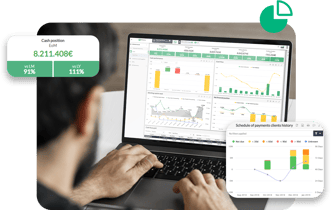Environmental, social, and governance (ESG) responsibility has become an essential imperative for businesses. ESG reporting is a key tool in the transition to a more sustainable future. However, this transition presents major challenges, especially for companies with limited resources.
A new European directive on corporate sustainability reporting (CSRD) came into effect on 1 January 2024. This directive highlights the concept of 'double materiality' which poses a significant challenge for companies in their reporting processes. Double materiality requires companies to report not only on their financial impacts on the environment and society but also on how these factors impact their financial performance.
Gathering information from various sources can be complex, particularly as it needs to be consolidated into a coherent and easily analysable format.
Affected Businesses
Initially, large publicly-listed companies with more than 500 employees will publish their first sustainability report. Subsequently, large non-listed companies meeting at least two of the following three criteria will take their turn:
- More than 250 employees,
- An annual turnover of more than 50 million euros,
- A balance sheet exceeding 25 million euros.
Other companies not yet subject to the directive will still feel its impacts soon. Indeed, larger companies already covered will demand greater sustainability transparency, compelling banks, investors, and suppliers to also align.
Particular Involvement in France
Bart Baute, CEO of EMAsphere, notes a specific trend in France:
"We observe that the demand for ESG reporting is stronger in France than in Belgium, particularly due to a major awareness campaign by French authorities."
Indeed, several reasons could explain this trend in France, including:
- France has three times more companies affected by the directive compared to Belgium, for example
- The French government imposes heavy fines for non-compliance
This increased awareness encourages companies to use software for managing their data and producing their ESG reporting, as offered by EMAsphere.
Benefits of EMAsphere
EMAsphere offers numerous connectors (with ERP systems, accounting, etc.), thus facilitating the gathering, structuring, and analysis of all types of data.
EMAsphere can help generate the dashboards necessary for ESG reporting, particularly through its HR reporting module which simplifies the creation of the 'social' aspect of ESG reporting. EMAsphere provides a range of preconfigured HR KPIs, such as gender distribution, age structure, contract types, etc. The HR reporting module thus enables efficient and innovative management of the social aspect while optimizing cost management.
Bart Baute emphasizes EMAsphere's ongoing commitment:
 “Our company remains focused on data structure. We anticipate the need to develop specific solutions by sector or company type to meet our clients' unique needs."
“Our company remains focused on data structure. We anticipate the need to develop specific solutions by sector or company type to meet our clients' unique needs."
In a world where sustainability has become a priority, ESG reporting plays a crucial role in demonstrating a company's commitment to responsible business practices. With solutions like EMAsphere, companies can overcome the challenges of ESG reporting and seize opportunities to progress towards a more sustainable future.
Take control of your data!

EMAsphere is a SaaS automated reporting platform for CFOs. Spend less time creating your dashboards and more time analysing them!

 Features
Features Data process
Data process Connectors
Connectors

 “Our company remains focused on data structure. We anticipate the need to develop specific solutions by sector or company type to meet our clients' unique needs."
“Our company remains focused on data structure. We anticipate the need to develop specific solutions by sector or company type to meet our clients' unique needs."
